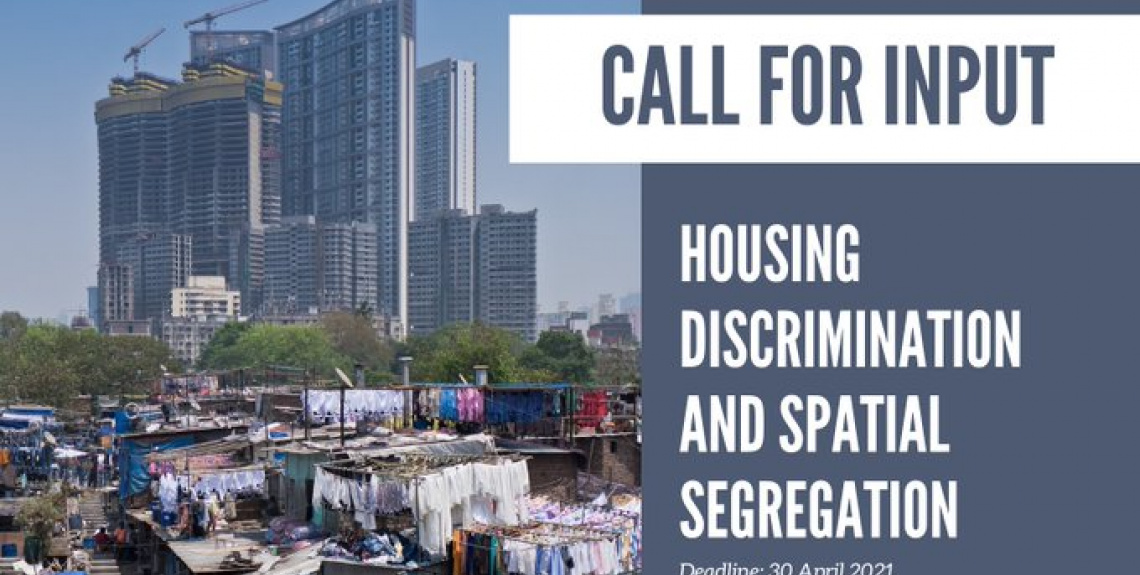The following information has been provided by the UN Special Rapporteur on the right to adequate housing, Mr. Balakirhsnan Rajagopal. It refers to a call for inputs open to local governments, on his next report on “Housing discrimination and spatial segregation”. Interested members are invited to send their contributions by following the guidelines provided below.
Members should send contributions to [email protected] and [email protected] before 30 April by using “Report on discrimination, segregation and the right to adequate housing” as subject line.
Source: UN Special Rapporteur on the right to adequate housing
The next thematic reports of the Special Rapporteur, Mr. Balakrishnan Rajagopal, will focus on the issue of racial, religious, caste, gender and other discrimination in relation to the right to adequate housing, including spatial inequalities and segregation in urban or rural-urban environments.
The main objectives of the two interlinked reports will be to identify contemporary and historical forms of discrimination and segregation that affect the right to adequate housing, to highlight good practices in the prevention of housing discrimination and segregation and to provide guidance to States on how they can fulfil their human rights obligations in this respect.
Key questions and types of input sought
To inform his reports, the Special Rapporteur welcomes contributions from States, local and regional governments, national human rights institutions, civil society organizations, academics, UN agencies and other stakeholders on the following issues:
- Studies and information concerning barriers to the enjoyment of the right to adequate housing experienced by individuals and groups due to discrimination by public or private actors;
- Information concerning patterns and practices of segregation including spatial segregation in urban, rural and peri-urban-rural contexts and the impacts of spatial inequality and segregation on affected communities:
- Factors, policies, laws and regulations contributing to spatial segregation or housing discrimination;
- Impact of spatial segregation in accessing in a non-discriminatory manner the right to adequate housing, public services, including electricity and access to digital services, ensuring security of tenure, and other rights, such as the rights to water, sanitation, education, health, work, the right to a safe and clean environment, and the right to equal protection of the security of the person;
- Tensions between the protection of cultural and minority rights, the rights of Indigenous Peoples, the freedom of choice of residence and the prohibition of discrimination under international human rights law. Suggestions how such tensions can or have been solved in compliance with international human rights law.
- Policies, laws and measures aimed at preventing discrimination and spatial segregation in relation to the right to adequate housing. Positive measures that have resulted in a reduction of spatial segregation and housing discrimination.
Download the questionnaire (Word): English | Français | Español
How and where to submit inputs/comments
Due to limited capacity for translation, the UN Special Rapporteur team kindly requests to submit responses, if possible, in English (preferred), Spanish or French. Responses should be sent to [email protected].
In order to ensure accessibility of information submitted for persons with visual impairments, submissions are preferred in Word format, not in PDF. Additional reports or documentation can be submitted to the Special Rapporteur by writing to [email protected].
E-mail address : [email protected]; [email protected];
E-mail subject line : Report on discrimination, segregation and the right to adequate housing
Postal address : Special Rapporteur on the right to adequate housing, Office of the United Nations High Commissioner for Human Rights, United Nations Office at Geneva, CH 1211 Geneva 10, Switzerland
Preferred file format : Word
Accepted languages : English, French, and Spanish
Treatment of inputs/comments received
All submissions received will be published on OHCHR websites, except where confidentiality is explicitly requested.


